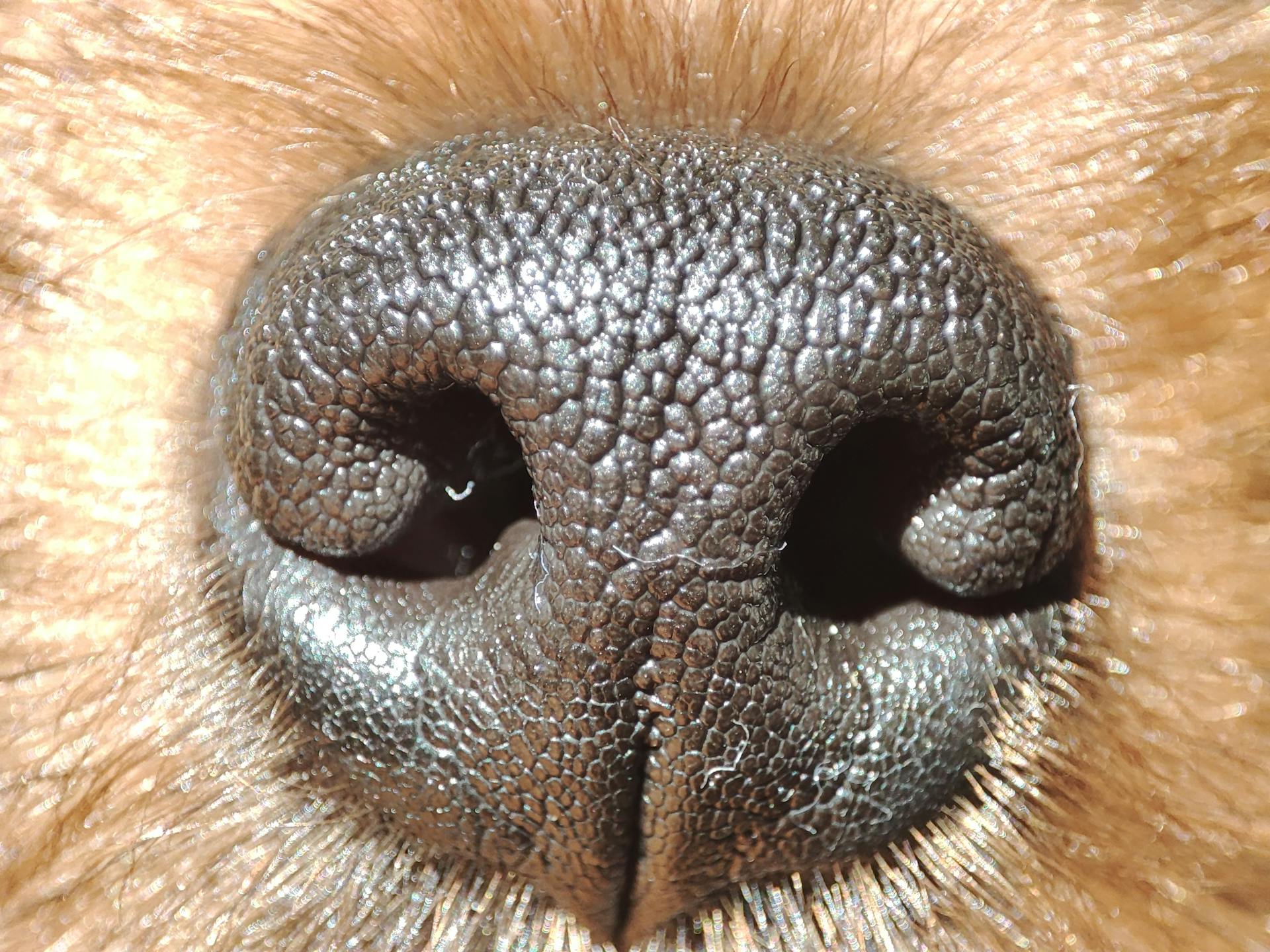
Skin allergies in dogs can be a real challenge for pet owners. They can cause itching, scratching, and discomfort for your furry friend.
It's estimated that at least 10% of dogs suffer from skin allergies. This can range from mild to severe, and can be triggered by various factors.
Common skin allergy triggers include environmental allergens like pollen, dust mites, and mold, as well as food allergies, fleas, and contact allergens like soaps and shampoos.
Causes of Skin Allergies in Dogs
Skin allergies in dogs can be caused by a variety of factors, and understanding these causes is key to providing the right treatment.
Flea allergy dermatitis is a common cause of skin allergies in dogs, and it's an allergic reaction to flea bites. This makes affected dogs extremely itchy, especially at the base of the tail.
Dogs with allergies are born with abnormal skin, like holes in a saran wrap, which allows allergens to enter through the skin layer and set off an allergic response.
You might enjoy: Home Remedies for Dogs with Flea Allergies
Allergies can be caused by environmental or seasonal factors, as well as food or contact allergies. Contact allergies can be caused by things like plastic food bowls or home cleaning products.
Flea dirt, which looks like black pepper on the skin surface, is often a sign of flea allergy dermatitis.
In addition to fleas, other skin parasites like mites, ticks, or lice can also cause skin allergies in dogs.
Skin problems in dogs can also be caused by medical conditions such as hormonal imbalances or autoimmune diseases.
A veterinarian may recommend diagnostic tests such as a skin scrape or a food trial to evaluate for food allergies.
Here are some common causes of skin allergies in dogs:
- Flea allergy dermatitis
- Environmental or seasonal allergies
- Food allergies
- Contact allergies
- Skin parasites like mites, ticks, or lice
- Medical conditions like hormonal imbalances or autoimmune diseases
Symptoms and Signs
Skin allergies in dogs can manifest in various ways, and recognizing the symptoms is essential for providing relief to your furry friend.
Redness of the skin is a common symptom of skin allergies in dogs, often accompanied by itchiness that can lead to chewing or scratching at the skin or ears.
Excessive hair loss, dull fur, or bald patches can also be signs of skin allergies, as dogs constantly scratch and lick the affected areas.
Flaky skin, dander, or oily skin can be caused by skin allergies, and may be accompanied by bumps, pustules, scabs, crusts, or wounds on the skin.
Hot spots, or moist, inflamed skin wounds caused by a dog repeatedly licking, chewing, or scratching the area, are another common symptom of skin allergies.
Head shaking can be a sign of ear infections, which are often associated with skin allergies.
Dogs with skin allergies may also experience chronic changes to the skin, such as thickening, permanent hair loss, or darkening of the skin.
In addition to skin symptoms, dogs with allergies may also exhibit digestive issues, such as vomiting, diarrhea, or gas.
Some common signs of skin conditions in dogs include excessive scratching, skin lesions, red spots, or raised bumps.
Here's a list of common symptoms of skin allergies in dogs:
- Itchy Skin (Pruritus)
- Skin Rashes and Hives
- Chronic Ear Infections
- Runny Nose and Watery Eyes
- Sneezing
- Paw Chewing/Licking
- Digestive Issues
- Hair Loss and Bald Patches
- Hot Spots
- Breathing Difficulties
- Behavioral Changes
Diagnosis and Testing
Diagnosing skin allergies in dogs requires a comprehensive evaluation by a veterinarian. This may involve a detailed review of the dog's medical history, physical examination, and specific allergy tests.
A veterinarian may perform a skin cytology, which involves taking a sample of skin cells from the dog to examine under a microscope. They may also do a skin scraping or take a swab of the dog's ears to gather more information.
Skin allergy testing for dogs involves injecting tiny amounts of each test allergen just under the dog's skin. If the dog shows a small raised reaction, the allergen causing it can be identified.
To determine the presence of dog allergies, veterinarians may use blood allergy testing, which is a convenient and easy test that involves drawing a small sample of the dog's blood. Blood allergy tests can identify reactions to a vast array of geographically appropriate allergens, including pollens, dust, and molds.
If this caught your attention, see: Blood Test for Dogs with Allergies
The most common cause of allergies in dogs is contact allergens, such as flea, food, and dust/pollen. These allergens can cause an allergic reaction in the body, leading to severe irritation and scratching.
Here are some common types of dog allergies:
- Contact allergy – including many grasses and plants, dust mites, and molds
- Flea allergies – many dogs are highly allergic to flea bites
- Food allergies – including different types of proteins
- Inhalant allergy (Atopy) – allergens that are inhaled
Treatment and Remedies
For skin allergies in dogs, the goal is to manage symptoms and minimize flare-ups.
The underlying cause of the allergy needs to be addressed, whether it's a parasite, a special diet for allergies, or an underlying medical condition.
Treatment for bacterial or yeast infections is crucial to prevent discomfort and delay healing.
Medications to relieve itch and inflammation are commonly used, including steroidal medications like prednisone and cortisone.
Antihistamines like Benadryl can be effective in preventing allergic reactions, but they're not a cure-all.
Ear cleanings and ear medications are essential, especially for dogs with allergies, to prevent infections and irritation.
A humidifier in dry climates can help prevent dry skin, which can exacerbate allergies.
Home remedies like soothing shampoos, skin supplements, and hydrocortisone cream can provide relief, but always consult with a veterinarian before using any new products.
Here are some common home remedies for dog rash:
- Skin supplements formulated for dogs
- Antihistamines like Benadryl (consult with a veterinarian for safe dosage)
- Soothing shampoos (aloe or oatmeal based)
- Wiping off your dog's paws and belly after a walk
- Hydrocortisone cream (apply directly on the rash, but be cautious of ingestion)
- Regular grooming appointments
- Routine ear cleanings
- Quality flea prevention
- Gentle antiseptic solutions for cleaning shallow wounds
Note: Always consult with a veterinarian before giving any medication or supplement at home, and schedule a visit if the rash is severe or doesn't heal after a few days of home treatment.
Types and Common Issues
Skin allergies in dogs can be caused by a variety of factors, including environmental allergens like pollen and dust mites, as well as food ingredients and flea bites.
There are several types of skin allergies in dogs, including environmental allergies, food allergies, flea allergy dermatitis, skin allergies (atopic dermatitis), and contact allergies.
Common allergens that can trigger skin allergies in dogs include pollen, fleas, dust mites, mold spores, food ingredients, household cleaning products, fabrics, and perfumes and deodorants.
Here are some of the common skin problems associated with skin allergies in dogs:
- Skin and ear infections
- Mites on the skin
- Immuno-compromised type conditions
- Hot spots
- Hair loss
- Secondary skin infections
Types of Reactions

Allergic reactions in dogs can manifest in various ways, from mild skin irritations to life-threatening conditions. Allergic dermatitis is one of the most common allergic reactions in dogs, often linked to environmental allergens, food, or flea bites.
Hives, or urticaria, appear as raised, itchy bumps on the skin, often as a reaction to insect stings, certain medications, or foods. They can cause significant discomfort, but are typically more alarming in appearance than they are dangerous.
Flea allergy dermatitis is an allergic reaction to flea bites, where a dog is allergic to flea saliva. This makes affected dogs extremely itchy, especially at the base of the tail, and their skin may become red, inflamed, and scabbed.
Here are some common types of allergic reactions in dogs:
- Environmental allergies: triggered by allergens found in a dog's surroundings, such as pollen, mold, dust mites, and grass.
- Food allergies: triggered by proteins like beef, chicken, dairy, or wheat.
- Flea allergy dermatitis: an allergic reaction to flea bites.
- Skin allergies: often related to environmental allergens, resulting in itchy skin, leading to scratching, licking, and biting at the skin.
- Contact allergies: less common, occurring when a dog's skin reacts to direct contact with substances like certain fabrics, plastics, or cleaning products.
In cases of severe skin problems or skin issues that don't respond well to standard treatments, a veterinary dermatologist may be recommended for referral.
How Common?
Allergies in dogs are quite common and are one of the frequent reasons for veterinary visits.

A large number of dogs experience some kind of allergy during their lifetime, whether it’s due to environmental factors, food, or other allergens.
According to the statistics, allergies in dogs are a significant concern for many pet owners.
Dogs of all ages and breeds can suffer from allergies, making it essential to be aware of the signs and symptoms.
Allergies can be caused by a variety of factors, including environmental allergens, food allergies, and other allergens.
In fact, a large number of dogs experience some kind of allergy during their lifetime.
Here's an interesting read: Environmental Allergies Dogs
Are Inherited?
Yes, allergies can be genetic, and certain breeds are more predisposed to developing allergies. Some dogs may inherit a genetic makeup that makes them more susceptible to developing allergic reactions to their environment or diet.
Frequently Asked Questions
What can I feed my dog for skin allergies?
For dogs with skin allergies, consider feeding a sensitive skin and stomach formula, such as Hill's Prescription Diet Dog i/d Sensitive Dry or Purina Pro Plan FOCUS Adult Sensitive Skin & Stomach Salmon & Rice Formula. These formulas are designed to help alleviate skin issues and promote overall health.
Can I give my dog Benadryl for skin allergies?
Yes, Benadryl (diphenhydramine) can be used to treat mild skin allergies in dogs, but it's essential to consult with a veterinarian first to determine the correct dosage and ensure safe use.
What is the most common dog allergy?
The most common dog allergy is allergic dermatitis, caused by reactions to fleas, food, or environmental allergens. Understanding the root cause is key to finding effective relief for your furry friend.
What is the best allergy medicine for dogs?
For dogs, the best allergy medicine depends on weight, with Cetirizine (Zyrtec) suitable for larger dogs, Loratadine (Claritin) for smaller dogs, and Clemastine (Tavist-1, Antihist-1) for medium-sized dogs. Consult your veterinarian for a personalized dosage recommendation.
How do I know what my dog is allergic to?
Your veterinarian can help determine what your dog is allergic to with a serum IgE test, a blood test that identifies specific food allergies. Discussing your pet's condition with your vet is the first step to finding out what they're allergic to.
Sources
- https://www.akc.org/expert-advice/health/dog-skin-allergies/
- https://bondvet.com/b/dog-rash
- https://www.cupolaanimalhospitals.com/services/dogs/dog-skin-problems
- https://www.merckvetmanual.com/dog-owners/skin-disorders-of-dogs/allergies-in-dogs
- https://urgentvet.com/allergies-in-dogs-symptoms-treatment/
Featured Images: pexels.com


